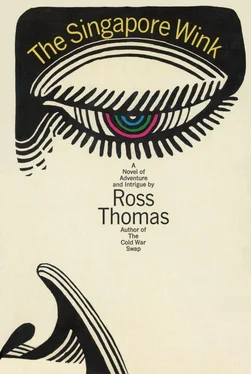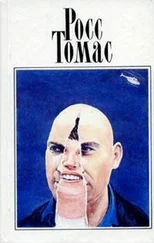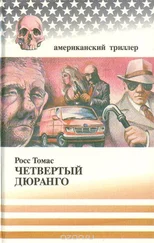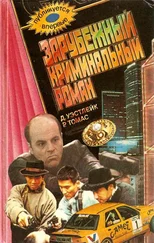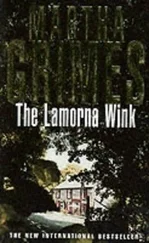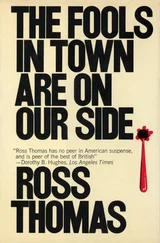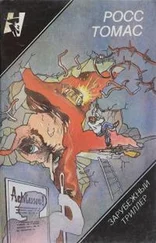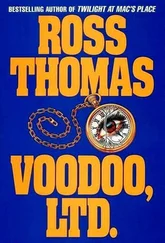“It’s what you usually have at home, isn’t it, Mr. Cauthorne?” Cole said after Joe had gone.
“Your chef is better than mine.”
“Well, let’s enjoy our dinner and then we can continue our discussion afterwards — over the brandy, as you suggested earlier.”
“It was growing interesting,” I said.
“It will get even more so,” Cole said and started to carve up his steak.
We ate almost in silence and when we were through Joe promptly appeared and cleared away the dishes and served the brandy and coffee. When he had gone once more, Cole offered me a cigar which I refused, carefully lighted one for himself, took a sip of his brandy, and said, “Now, where were we?”
“Angelo Sacchetti was blackmailing you.”
“Yes.”
“I assume that you’ve been paying.”
“I have indeed, Mr. Cauthorne. In the past eighteen months I have paid only slightly less than a million dollars.”
I smiled for what must have been the first time that evening. “Then you’re in real trouble.”
“You seem inordinately pleased.”
“Wouldn’t you be in my position?”
“Yes, as a matter of fact, I suppose I would. My enemy’s troubles are my good fortune and all that sort of thing. You do consider me your enemy?”
“Let’s just say I doubt that we’ll ever be close friends.”
Cole drew on his cigar and then slowly blew the smoke out. I noticed that he inhaled it. “You’ve heard,” he said, “that they call me Charlie the Fix. Do you have any idea of what the nickname implies?”
“Some,” I said. “The corruption of public officials and civil servants probably. A few bribes here and there. A little subornation of perjury, I suppose, plus the discreet use of a sizable political slush fund.”
Cole smiled slightly. “I see,” he said. He paused for a moment, as if deciding about how much he could safely tell. “I came to Washington in 1936 — the year you were born, I believe. And despite my rather excellent education, I was, as they say, grass green. I needed a mentor, someone to guide me through the bureaucratic and political maze. I told them that I needed this and they quickly found just the man.”
“You’ve been using ‘they’ and ‘them,’” I said. “I’ve asked who they are before, but I’ve never got a satisfactory answer. Who are ‘they,’ the outfit, the organization, the mob, the Mafia, the Cosa Nostra? Is there a name for them and they?”
Cole smiled again, even more slightly than before. “It’s a peculiarly American trait, I suppose, this insistence upon a descriptive noun. It was poor old Joe Valachi who called it the Cosa Nostra because the Government was pressing him to give them a title. So one Narcotics Bureau Agent said ‘cosa’ and Valachi came back with ‘nostra,’ and they ran with it from there. Of course, if two persons of Italian descent were speaking about a mutual project, they might say, ‘Questa è una cosa nostra,’ but they would really be saying, “This is an affair of ours.’ They certainly wouldn’t be saying ‘I am a member of “our thing” or “our affair.”’”
“What about the Mafia?” I said. “Or is that old hat?”
“It implies a Sicilian organization, and although there are certain ties with it in Sicily — Luciano during World War II, for example — there is no Mafia as such in the United States.”
“What is there then?”
“A group of totally amoral businessmen of Italian and Sicilian descent who control the vast majority of organized illegal activities that go on in this nation. They don’t call themselves anything.”
“And they are the ones you turned to in 1936 when you needed your mentor or guide?”
Cole tapped his cigar ash into a tray. “Yes. They were the ones who sent me through college and law school. When I told them that I needed a guide, they promptly secured me a full partnership in a most respectable Washington law firm, the same one in which I’m now senior partner, Harrington, Mecklin, and Cole.”
“Mecklin I’ve heard of,” I said.
“He almost became a Supreme Court judge.”
“What happened?”
“Harrington had died by the time I came along in 1936. Mecklin, unfortunately for him, was a compulsive gambler. Everything. Horses, poker and bridge, but especially poker. So one evening at a most respectable club here in Washington my sponsors, shall we call them, slipped a mechanic into the game and he took Mr. Mecklin for around fifty thousand dollars that night. Another game was arranged later in the same week, and Mecklin dropped seventy-five thousand dollars. The mechanic, who was also a consummate confidence man, as most of them are, agreed to yet another game to give Mecklin a chance to win. This time he dropped ninety thousand dollars and, of course, he couldn’t pay. The confidence man grew impatient, threatened exposure, and my sponsors hurriedly came to the rescue with a loan which enabled Mecklin to pay off the debt in full. However, my sponsors grew just as impatient for full repayment and when Mecklin was unable to meet their, shall we say, rather importunate demands, they suggested that the firm take me in as a full partner.”
“Then it cost them around $215,000 to get you a partnership,” I said.
Cole chuckled his pleasant sound. “Not at all. It cost them only a thousand or so for the con man’s services. The money that they lent Mecklin to pay off his debts was promptly returned to them by the con man.”
“Then what happened?”
“Word got around, as it always does, and Roosevelt changed his mind about Mecklin. The man grew absolutely bitter. He began to take an almost perverse delight in plunging into legal tangles whose outcome could only embarrass the administration. More often than not, he was successful, and he took me along with him. He taught me the art of accommodation and compromise and believe me, Mr. Cauthorne, they are most valuable skills.”
“I don’t quite follow you,” I said.
“Every so often, a crusader dons his sword and buckler and journeys forth against the infidel who goes by the name of organized crime. In the early 1950’s, it was the good Senator Kefauver. Then Senator McClelland tilted his lance against the same foe in the 1960’s and later in the decade along came the Task Force on Organized Crime, appointed by the President.”
“I remember,” I said. “I also remember that nothing much happened.”
“After the rather tawdry findings of each of these investigations were released, there was a brief public outcry, a kind of ‘My, isn’t that awful and why don’t they do something about it’ type of outcry, if you will.”
“But not much else,” I said.
“Very little, and for very good reason, too. You see the law enforcement agencies, state and local as well as federal, are perfectly aware of what’s going on and who’s profiting from it. They have, over the years, worked out a degree of accommodation with those responsible, a tacit understanding concerning territories and scope of operation. In exchange for the discipline which my sponsors, as I’ve referred to them, are capable of exercising, the law enforcement authorities are content to compromise on some minor but essential points — so long as they know where the ultimate responsibility lies. One of my principal tasks is to maintain this détente .”
“And a few hundred thousand dollars can work miracles,” I said.
“A few million, you should say.”
“And you have it to offer?” I asked.
“Yes, I have it to offer, but not quite in the way or to the persons whom you might suspect. Suppose I wanted to influence a Senator in behalf of a client so that the Senator would influence someone else. There would never be a direct approach. It would come instead from the Senator’s bank or a chief political supporter or even from another Senator whose own bank might be exerting similar pressure on him. It’s all quite indirect.”
Читать дальше
